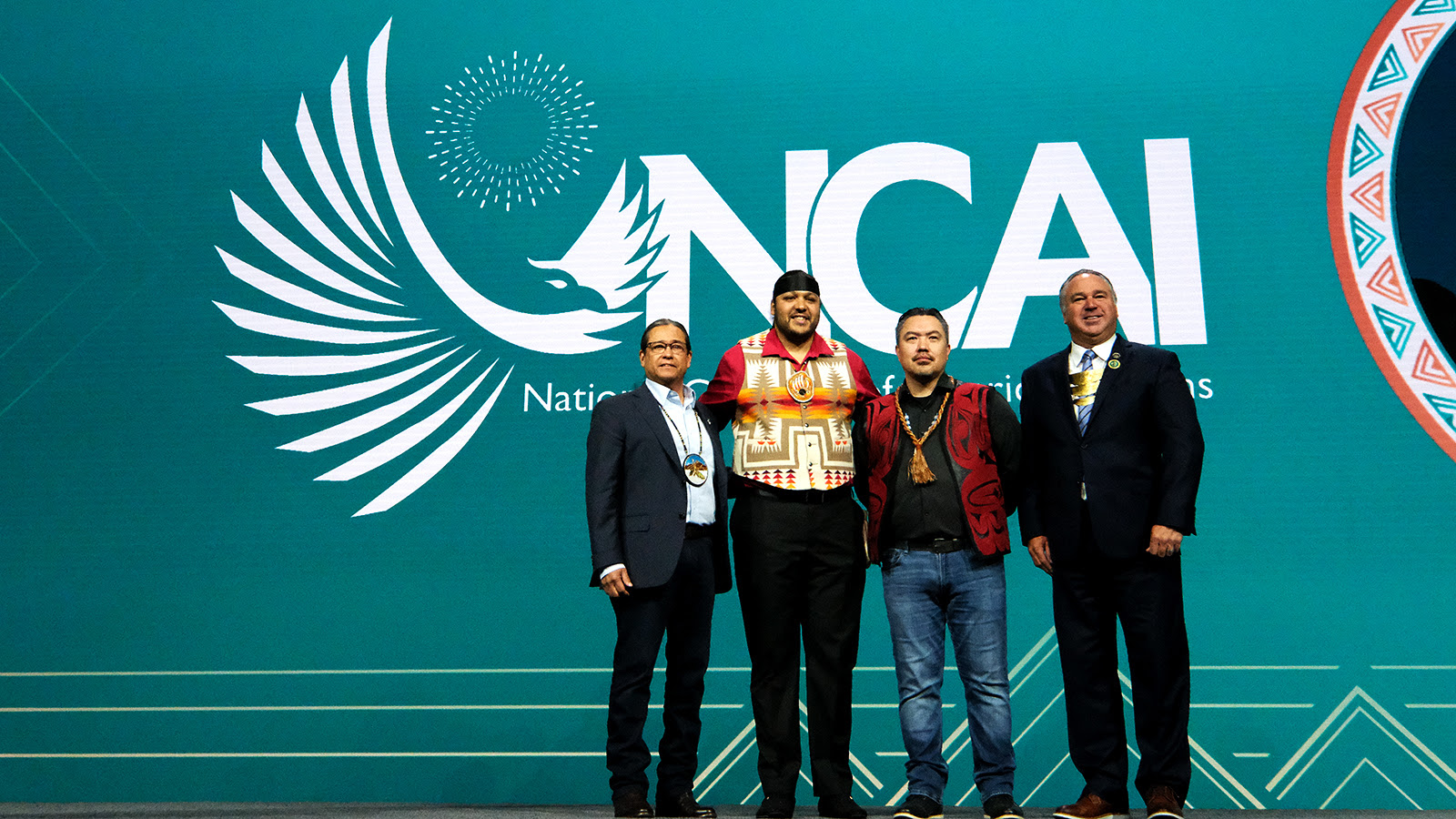
- Details
- By Levi Rickert
NEW ORLEANS — On the last days of its e 80th Annual Convention & Marketplace, the National Congress of American Indians (NCAI) swore in the newly elected 2023-2025 NCAI Executive Committee.The organization’s Executive Committee is comprised of four Executive Board Officers and Regional Vice Presidents and Alternates from each of the 12 NCAI regions.
Newly elected NCAI President Mark Macarro, Chairman of Pechanga Band of Luiseño Indians, expressed a message of unity and healing on the horizon for Indian Country.
‘‘I am deeply humbled and pleased to have been chosen by the National Congress of American Indians to lead this esteemed organization over the next two years,” said President Mark Macarro. “The next two years will undoubtedly present challenges, but together, we are ready for the journey ahead. I dedicate myself not only to the tribal leaders and delegates of NCAI, but to all of Indian Country, and I look forward to what we can achieve together.”
President Mark Macarro is joined by newly elected NCAI First Vice President Brian Weeden, who also serves as the Chairman of the Mashpee Wampanoag Tribe.
Nickolaus D. Lewis, Lummi Nation councilmember, was elected to the position of Recording Secretary.
“Serving on the NCAI Executive Board as Recording Secretary is a position dedicated to serving all of Indian Country, and I am humbled with the opportunity to be a servant for all of our people in this role,” said Recording Secretary Lewis. “There is a lot of work ahead, and it starts with working to earn our people's trust. It will take time, but the commitment to be held accountable is going to always be there. Please know that I am committed to this work for uplifting all of our peoples and our future generations.”
David Woerz, Chickasaw Nation Legislator, was elected to the position of NCAI Treasurer by acclamation.
“I am honored to be elected as Treasurer of the National Congress of American Indians. I am also excited about the future of NCAI. The Executive Committee and Executive Director Larry Wright, Jr. have spent the last 18 months examining our policies and procedures. As a result, NCAI has better checks and balances, a vastly improved workplace culture, and renewed energy. We have expanded staff and finally evolved from the post-pandemic issues many organizations experienced. I will fulfill my duties as Treasurer with honor, integrity, and in compliance with the NCAI Constitution. I realize it is much more than just finances, our organization is dynamic with many moving parts. It will be a challenge, but one I am excited to meet.”
The NCAI Executive Board Officers are joined by Regional Vice Presidents and Alternates from the 12 NCAI regions. Elected by their respective Regional Caucuses, the Regional Vice Presidents and Alternates serve alongside the Executive Board Officers for a two-year term. The 2023-2025 Regional Area Vice Presidents and Alternates are listed below:
Alaska Vice President: Brian Ridley, Native Village of Eagle
Alaska Alternate: Clinton Cook, Craig Tribal Association
Northwest Vice President: Leonard Forsman, Suquamish Tribe
Northwest Alternate: Melvin Sheldon, Tulalip Tribes
Great Plains Vice President: Ryman Lebeau, Cheyenne River Sioux Tribe
Great Plains Alternate: J. Garrett Renville, Sisseton-Wahpeton Oyate
Western Vice President: Randi Lone Eagle, Summit Lake Paiute Tribe
Western Alternate: Warren Graham, Duckwater Shoshone Tribe
Southwest Vice President: Raymond Aguilar, Pueblo of Santo Domingo
Southwest Alternate: Gary Lujan, Pueblo of Taos
Southern Plains Vice President: Reggie Wassana, Cheyenne and Arapaho Tribes
Southern Plains Alternate: Christie Modlin, Iowa Tribe of Oklahoma
Midwest Vice President: Leonard Fineday, Minnesota Chippewa Tribe - Leech Lake Band
Midwest Alternate: Michelle Beaudin, Lac Courte Oreilles Band of Lake Superior
Eastern Oklahoma Vice President: Joe Deere, Cherokee Nation
Eastern Oklahoma Alternate: Brad Killscrow, Delaware Tribe of Indians
Pacific Vice President: Leo Sisco, Santa Rosa Rancheria Tachi Yokut Nation
Pacific Alternate: Jack Potter Jr., Redding Rancheria
Rocky Mountain Vice President: Jennifer Finley, Confederated Salish and Kootenai Tribe of the Flathead Reservation
Rocky Mountain Alternate: Loni Taylor, Chippewa Cree of the Rocky Boy's Reservation
Northeast Vice President: Lance Gumbs, Shinnecock Indian Nation
Northeast Alternate: Rodney Butler, Mashantucket Pequot Tribe
Southeast Vice President: Reggie Tupponce, Upper Mattaponi
Southeast Alternate: Lora Ann Chaisson, United Houma Nation
More Stories Like This
Native News Weekly (August 25, 2024): D.C. BriefsNavajo Nation Secures $285 Million in Federal Broadband Funding to Connect Thousands of Homes
Oral History Project Announces 18th Stop in Denver, Colorado: NABS Continues Preserving Critical Stories Across Indian Countr
Next on Native Bidaské: Protecting Legacy Before It’s Forgotten with the National Native American Hall of Fame
Zuni Youth Enrichment Project Wins $25,000 National Award to Strengthen Long-Term Support for Zuni Youth
Help us defend tribal sovereignty.
At Native News Online, our mission is rooted in telling the stories that strengthen sovereignty and uplift Indigenous voices — not just at year’s end, but every single day.
Because of your generosity last year, we were able to keep our reporters on the ground in tribal communities, at national gatherings and in the halls of Congress — covering the issues that matter most to Indian Country: sovereignty, culture, education, health and economic opportunity.
That support sustained us through a tough year in 2025. Now, as we look to the year ahead, we need your help right now to ensure warrior journalism remains strong — reporting that defends tribal sovereignty, amplifies Native truth, and holds power accountable.
 The stakes couldn't be higher. Your support keeps Native voices heard, Native stories told and Native sovereignty defended.
The stakes couldn't be higher. Your support keeps Native voices heard, Native stories told and Native sovereignty defended.
Stand with Warrior Journalism today.
Levi Rickert (Potawatomi), Editor & Publisher

